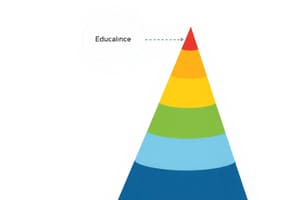Podcast
Questions and Answers
What is the primary focus during the Cognitive Stage of learning?
What is the primary focus during the Cognitive Stage of learning?
- Refining skills for consistency
- Performing skills automatically
- Familiarizing with basic movements (correct)
- Understanding strategic aspects
In which stage of learning do performers begin to integrate discrete actions into a series of actions?
In which stage of learning do performers begin to integrate discrete actions into a series of actions?
- Motor Stage (correct)
- Preparation Stage
- Cognitive Stage
- Autonomous Stage
Which form of transfer of learning is characterized by similar elements improving performance?
Which form of transfer of learning is characterized by similar elements improving performance?
- Negative Transfer
- Absolute Transfer
- Zero Transfer
- Positive Transfer (correct)
An example of negative transfer would be:
An example of negative transfer would be:
At what stage does the focus shift to the strategic aspects of performance?
At what stage does the focus shift to the strategic aspects of performance?
What is an example of zero transfer?
What is an example of zero transfer?
What is true of a person in the Autonomous Stage of skill learning?
What is true of a person in the Autonomous Stage of skill learning?
Which type of transfer would occur when learning a tuck forward roll benefits the mastery of a straddle forward roll?
Which type of transfer would occur when learning a tuck forward roll benefits the mastery of a straddle forward roll?
Which of the following best describes the Motor Stage of learning?
Which of the following best describes the Motor Stage of learning?
Flashcards
Cognitive Stage of Learning
Cognitive Stage of Learning
The learner focuses on understanding the basic movements and getting a grasp of the skill. They receive feedback from visual cues, instructions, and physical sensations.
Motor Stage of Learning
Motor Stage of Learning
The learner starts connecting individual actions into a smooth sequence. They improve smoothness, timing, and consistency. The focus shifts to making the skill more precise.
Autonomous Stage of Learning
Autonomous Stage of Learning
The skill becomes almost automatic and effortless. Errors are minimal and focus shifts to strategic aspects of the performance. The skill becomes a habit.
Transfer of Learning
Transfer of Learning
Signup and view all the flashcards
Positive Transfer of Learning
Positive Transfer of Learning
Signup and view all the flashcards
Negative Transfer of Learning
Negative Transfer of Learning
Signup and view all the flashcards
Zero Transfer of Learning
Zero Transfer of Learning
Signup and view all the flashcards
Study Notes
Stages of Learning
- Learning can be divided into three stages: cognitive, motor, and autonomous.
- Cognitive stage: Learners try to understand and become familiar with basic movements, processing visual, verbal, and kinesthetic feedback.
- Motor stage: Learners integrate actions into a sequence, focusing on consistency, anticipation, and timing.
- Autonomous stage: Skill execution is automatic, smooth, and efficient, with minimal errors. Emphasis shifts to strategic aspects.
Transfer of Learning
- Transfer of learning is the impact of past experiences on current learning/performance.
- Positive transfer: Occurs when prior knowledge aids current learning. Similar elements facilitate learning, e.g., performing a tuck forward roll and a straddle forward roll.
- Negative transfer: Occurs when prior knowledge hinders learning. Different movements/skills conflict, e.g., using table-tennis muscles in tennis.
- Zero transfer: Prior experiences have no influence on current learning/performance. Dissimilar skills, like swim and table tennis, don't affect one another.
Studying That Suits You
Use AI to generate personalized quizzes and flashcards to suit your learning preferences.




